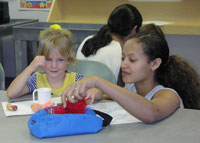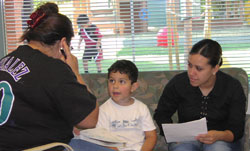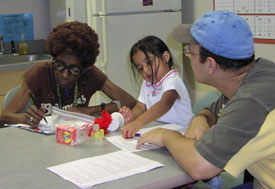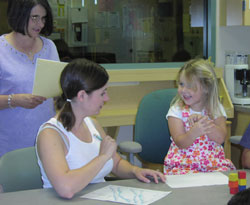 (PHOENIX,
Ariz., Sept. 23, 2003) - First semester students enrolled in the nursing
program at Phoenix College recently had the chance to hone their skills
while performing the Denver Developmental Screening Test (DDST) on 3-to-5-year-olds
in the Family Care Center.
(PHOENIX,
Ariz., Sept. 23, 2003) - First semester students enrolled in the nursing
program at Phoenix College recently had the chance to hone their skills
while performing the Denver Developmental Screening Test (DDST) on 3-to-5-year-olds
in the Family Care Center.
The DDST was developed as
a screening tool to detect potential developmental problems in young children.
Often times, developmental deviations in children are overlooked because
it is difficult to spot them during routine checks.
"It’s a twofold
experience," said Karen Flanigan, a member of the nursing faculty.
"The students are able to familiarize themselves with the DDST while
learning how to warm up and respond to children."
 Every
year, first semester nursing students have the opportunity to assess children
in the Family Care Center using the DDST. When the students are on their
way, Cynthia Cross, senior lead teacher of the Family Care Center’s
preschool room, explains to the children that the nursing students are
coming and energetically asks if anyone wants to play games with them.
Once the children realize that fun is involved, there is an overwhelming
response to participate.
Every
year, first semester nursing students have the opportunity to assess children
in the Family Care Center using the DDST. When the students are on their
way, Cynthia Cross, senior lead teacher of the Family Care Center’s
preschool room, explains to the children that the nursing students are
coming and energetically asks if anyone wants to play games with them.
Once the children realize that fun is involved, there is an overwhelming
response to participate.
Turning the DDST into a game
is simple since the test administrators use standardized kits that include
red yarn, a bell, a small baby doll, baby bottle, small glass jar, wooden
blocks, a tennis ball and a plastic cup. Examples of the activities that
children are asked to demonstrate are to recognize objects, draw shapes
and tell the test administrator how certain objects are used.
 What
may have been a fun filled morning for the children served as a valuable
learning experience for the nursing students. Not only did the students
become enthused about working with children, they also helped the Family
Care Center’s preschool staff (Cynthia Cross, Mia Smith, and Kathleen
Rabb) detect children that may be experiencing difficulties. This aids
the staff in getting appropriate attention for the child.
What
may have been a fun filled morning for the children served as a valuable
learning experience for the nursing students. Not only did the students
become enthused about working with children, they also helped the Family
Care Center’s preschool staff (Cynthia Cross, Mia Smith, and Kathleen
Rabb) detect children that may be experiencing difficulties. This aids
the staff in getting appropriate attention for the child.
"The children selected
for this test were chosen simply because of their age," said Cross.
"But if a student suspects that a child is not performing well, they
report it to us. This serves as a first step in discovering potential
developmental weaknesses."
 The
DDST tests children between birth and six years of age in four categories:
fine motor, gross motor, language and personal-social skills. Main reasons
for administering the test are to monitor children who are at high risk
for developmental setbacks due to prenatal difficulties or to objectively
confirm intuitive suspicions. Although it is not typical for registered
nurses to administer the DDST, it is imperative that they have an understanding
of the test and it’s implications.
The
DDST tests children between birth and six years of age in four categories:
fine motor, gross motor, language and personal-social skills. Main reasons
for administering the test are to monitor children who are at high risk
for developmental setbacks due to prenatal difficulties or to objectively
confirm intuitive suspicions. Although it is not typical for registered
nurses to administer the DDST, it is imperative that they have an understanding
of the test and it’s implications.
###